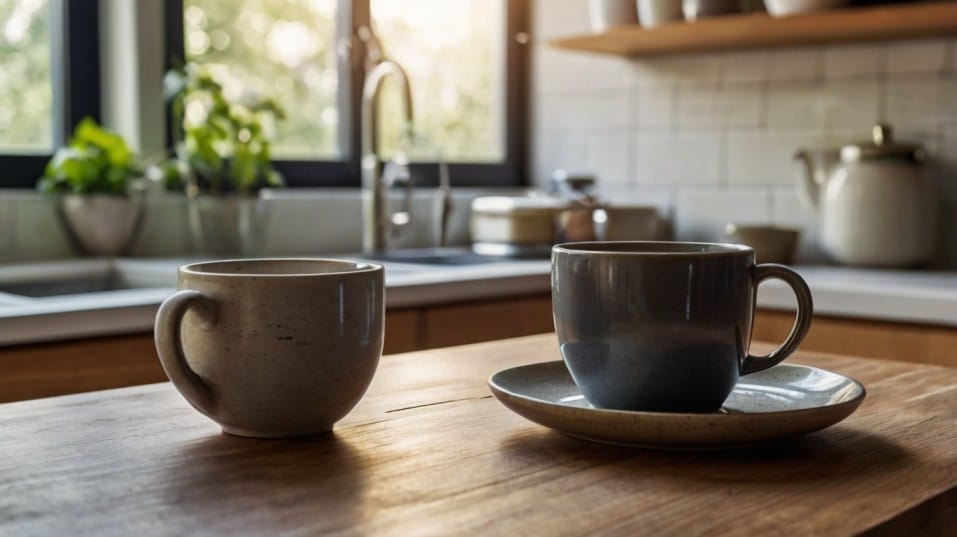Caffeine Cut-Off Time: When Is Too Late?
Cut your caffeine at the right time and unlock deeper sleep, more energy, and better mornings—without giving up your favorite cup.

Ever wonder why you’re still tossing and turning even after dialing in your bedtime? The answer might be in your coffee cup.
Caffeine doesn’t just hype you up—it hijacks your brain’s natural wind-down signals, often hours after your last sip.
If you’ve never considered when you drink it, now’s the time. Because timing your caffeine right could be the simplest, science-backed shift that transforms your sleep—and your next day.
Your Brain on Caffeine
Caffeine doesn’t give you energy. It delays fatigue. Big difference. Here’s what’s happening behind the scenes: as you go through your day, a compound called adenosine builds up in your brain.
The more it accumulates, the sleepier you feel. It's one of your body's natural systems for making sure you wind down in the evening. Caffeine blocks adenosine. That’s its job. And it does it well—maybe too well.
When you drink caffeine, it binds to adenosine receptors, essentially hitting the mute button on your brain’s “time to rest” signals. That’s great for powering through an early meeting or crushing a workout.
But late in the day, it throws off your internal rhythm, delaying sleep onset, disrupting sleep stages, and even cutting into the deep, restorative sleep your body needs to recover and recharge.

Half-Life Matters
Caffeine doesn’t vanish from your system the moment you feel the buzz wear off.
Its half-life—the time it takes your body to clear half of it—ranges from 5 to 7 hours, depending on your genetics, liver function, and other lifestyle factors like birth control or stress levels.
That means a 3 PM pick-me-up could still be swirling in your bloodstream at 9 or 10 PM. You might fall asleep, but chances are high that you’ll toss, turn, wake up often, or miss out on deep sleep altogether.
And here’s the kicker: poor sleep makes you crave more caffeine the next day. That extra cup pushes your cut-off time even later, and suddenly you’re stuck in the loop—wired, tired, and dependent.
The Optimal Cut-Off Time
Let’s cut to it: aim to stop all caffeine 8 to 10 hours before bedtime. For most people, that means calling it by 2 PM at the latest—and ideally closer to noon.
If your target bedtime is 10 PM, and you're still sipping coffee at 4 or 5, you're compromising your sleep, even if you swear it “doesn’t affect” you.
You may have built up a tolerance to the feeling of caffeine, but your sleep architecture still takes the hit. You won’t know how much better you could feel until you actually experience what a caffeine-free evening delivers.
Coffee Isn’t the Only Culprit
Don’t just focus on espresso shots and cold brew. Caffeine hides in places you might not expect:
Hidden Sources of Caffeine
- Green and black teas (some have 30–50 mg per cup)
- Matcha (small amounts add up fast)
- Dark chocolate (especially after dinner)
- Pre-workouts and recovery drinks
- “Natural energy” supplements and even decaf coffee (which still contains trace amounts)
If you’re still struggling to fall asleep despite keeping coffee to the morning, scan your afternoon and evening routine. Those “harmless” teas and squares of chocolate may be undermining your sleep without you realizing it.
Making the Shift (Without Losing Your Mind)
Changing your caffeine timing doesn’t mean you have to suffer through sluggish afternoons. You’re not giving up energy—you’re reclaiming it by restoring your body’s natural rhythm.
Smarter Strategies That Work
- Front-load your caffeine. Get your full dose before noon. Want a little boost mid-morning? Go for it. Just draw the line before lunch.
- Build a replacement ritual. Swap your 3 PM coffee with something zero-stim but still satisfying—like herbal tea, sparkling water with citrus, or a decaf blend. You want the experience, not the stimulant.
- Use movement strategically. A brisk walk outside resets your energy better than another latte. Bonus: it helps regulate melatonin later on.
- Hydrate more than you think you need to. Fatigue often masquerades as dehydration. Before you reach for caffeine, try water with a pinch of salt or an electrolyte tab.
Within a few days of holding that earlier cut-off, your body adapts. Your afternoon alertness starts to stabilize. Falling asleep gets easier.
Waking up doesn’t feel like you’re crawling out of a swamp. The difference is real—and you don’t need to wait weeks to feel it.
Final Thoughts
There’s no need to quit caffeine. Just learn to time it smarter. Cut it off by early afternoon, and you unlock deeper sleep, better recovery, and a brain that actually feels awake in the morning.
You’ll reduce dependency, not pleasure. You’ll feel human again, not jittery or drained.
So here’s the move: pick your new cut-off time—whether it’s 2 PM or noon—and stick to it for one week. No caffeine after that window. No compromises. See how you feel.
Start today. Sleep better tonight. Repeat tomorrow with more clarity, more calm, and way more energy to burn.




